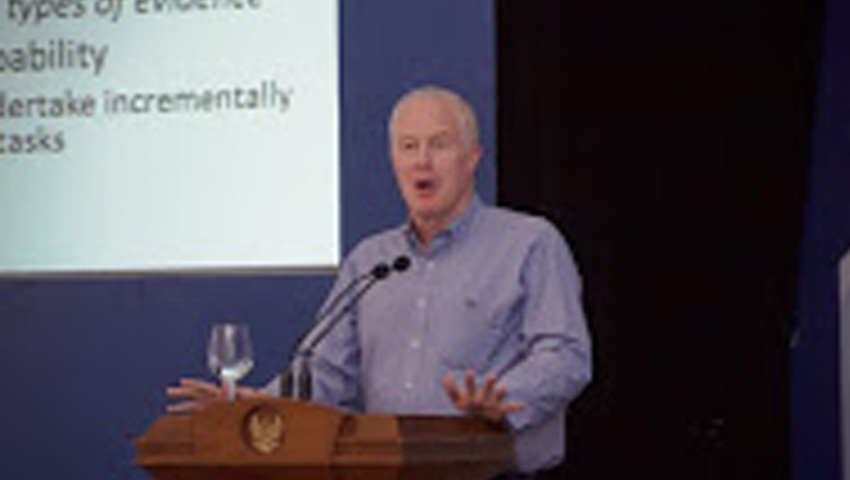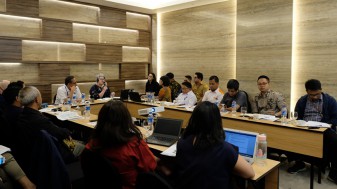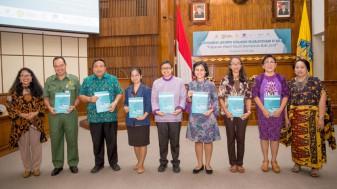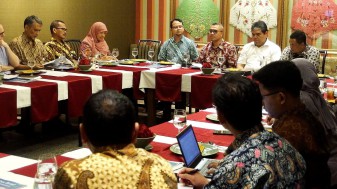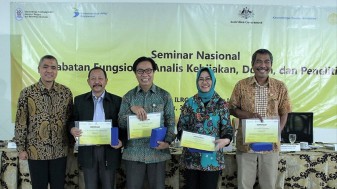Development 2.0: future or already reality? A discussion with Michael Woolcock
By Arnaldo Pellini, KSI
Michael Woolcock, the Lead Social Development Specialist at the World Bank, visited the Knowledge Sector Initiative (KSI) office in Jakarta on August 18, 2015. He is one of the leading voices in the debate around new ways for approaching development problems and designing development interventions that are more flexible and context specific. With Lant Pritchett of CGD, Matt Andrews of Harvard, David Booth of ODI and others, he is searching for approaches to development that break with the orthodoxy of results and one size fits all solutions. He is the co-author of a well known paper that presents an alternative approach, the Problem Driven Iterative Adaptation.
It is always a bit strange to meet in person somebody whose work we read during a PhD or a policy research project. In my case, the work of Michael Woolcock on social capital, helped me in defining the conceptual framework of the research I did on the decentralization reform in Cambodia and the space for community engagement in primary schools management. Anyhow, this reflection is not about that thesis is about what Michael Woolcock said and discussed with the KSI team during the one and half hour he spent at our office.
Here the main points I took with me.
1) We are entering the Development 2.0 era. Development 1.0 was concerned with technocratic reforms required to provide access to basic services such as education and health. Most countries (certainly middle income countries) have achieved that and have the infrastructures in place: policies, schools, health centers, textbooks, etc. Development 2.0 is about the state capability to make those systems work, providing good quality public services to citizens. For example, schools have been built, teachers are trained, national policies on salary and curricula are in place. So, why is it that some schools perform well and other do not perform well? Those are the questions that we need to research and answer in Development 2.0.
2) Development 2.0 is not about finding smart or best practices so to scale them up and translate them into nation-wide policies. It is more about mapping out where public services work well and why as well as where service do not work well and why. This will require to move from the technocratic evidence and knowledge central to Development 1.0, to a more multidisciplinary approach to research and multiple types of evidence that can inform policy decisions aimed at improving service delivery.
3) The new evidence generated by various types of research methods and various types of knowledge (eg, community knowledge) will produce maps of variations in service quality and delivery. That variation has to be accepted and understood so that context specific policy responses can be designed and implemented.
4) Development 2.0 is an era where variation and uncertainty have to be accepted and embraced. It is an era where one-size-fits-all solutions will struggle to succeed and where context specific, technically sound and politically feasible solutions can have a greater chance of success.
5) Within this evolving context, we, development practitioners and researchers, have to learn to become more modest in what we learn and especially what we suggest. We can map where bureaucracies struggle and contribute with ideas that can help segments or units of the bureaucracy to provide the services that citizen expect from them. We should avoid the temptation to suggest the solution having mapped with our work only small bits of complex political and institutional realities.
At the end of the meeting I remembered the review written by Malcolm Gladwell about the biography of Albert O. Hirschman, The Gift of Doubt: ‘The economist Albert O. Hirschman […] was a “planner,” the kind of economist who conceives of grand infrastructure projects and bold schemes. But his eye was drawn to the many ways in which plans did not turn out the way they were supposed to—to unintended consequences and perverse outcomes and the puzzling fact that the shortest line between two points is often a dead end. He understood the power of failure and had the gift of doubt.’
Development 2.0 is already here. It seems to me that we should all make use of the same gift of doubt if we are to contribute to development progress and innovation.

